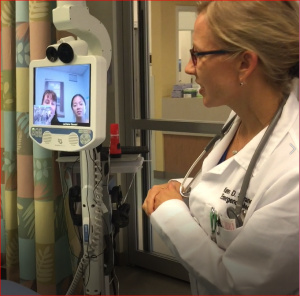A grant from The Duke Endowment funded the creation of the Telemedicine Child Maltreatment Outreach Service. The service connects six UNC Health Care facilities to the UNC Child Protection Team for consultation in suspected cases of child abuse.

A grant from The Duke Endowment funded the creation of the Telemedicine Child Maltreatment Outreach Service. The service connects six UNC Health Care facilities to the UNC Child Protection Team for consultation in suspected cases of child abuse.

Media Contact: Jamie Williams, jamie.williams@unchealth.unc.edu, 984-974-1149
Child abuse is a serious problem with long-term consequences, impacting a child’s brain development and learning as well as physical and emotional health. In 2014, approximately 130,000 children were referred to the North Carolina Department of Social Services because of concerns about abuse and/or neglect.
While hospital emergency departments play a key role in the identification and management of abused children, child abuse is still underreported and under recognized. Many community hospitals do not have trained specialists to guide the medical workup and coordinate the necessary follow-ups.
In the face of this need, Molly Berkoff, MD, director of UNC’s Child Protection Team, received a grant from The Duke Endowment to improve recognition and care of children with suspected abuse and neglect in North Carolina. The grant funds the Child Maltreatment Telemedicine Outreach Program, a 24/7 consultation service staffed by child abuse specialists. LaClaire Stewart, MD, MPH, a pediatrician on the Beacon Child Protection Team, leads the Child Maltreatment Telemedicine Outreach Program. The team also includes Karen Serrano, MD, from the Department of Emergency Medicine, who provides critical assistance in implementing the program, and Sondi Stachowski, UNC Family Advocate, who works closely with clinicians and families to assist with case management.
The program is now operational at six UNC Health Care facilities, including Chatham Hospital, UNC Health Care Hillsborough, UNC REX, Nash Health Care, Johnston Health-Smithfield, and Johnston Health-Clayton.
Stewart said since the program’s rollout they have provided more than 100 consultations. Using the technology, providers at UNC Medical Center can offer assessment over video and also speak directly with providers and staff about cases.
“We’re trying to take the collective knowledge of our Child Maltreatment Section and make that available to everyone so we can all learn from these issues,” said Stewart.
Community EDs typically have little to no ongoing education or guidelines in place to assist providers in up-to-date management of child abuse. A low volume of child abuse cases seen also provides challenges to providers.
“A fairly new focus in child abuse is awareness of sentinel injuries–bruises, frenulum tears, subconjunctival hemorrhage–, things that would not seem to warrant further workup unless you were suspicious of abuse,” Stewart said. “These are injuries often seen early in an escalating cycle of abuse, so we want to catch them before the kids come back with more serious injuries. They also may be the only visible evidence of harm in infants with fractures or head injuries.”
In addition to real time consultation, the Telemedicine Child Maltreatment Outreach Service also offers case management feedback regarding follow up calls to the child’s primary care physician and the Department of Social Services.
“We always tell the ED providers what we did, what happened, and then I try to provide some take home points for each case that they can use going forward,” Stewart said.
Stewart emphasizes that if providers have any questions regarding possible child abuse cases, they should not hesitate to use this service.
“If you have any question at all, please call us,” Stewart said.